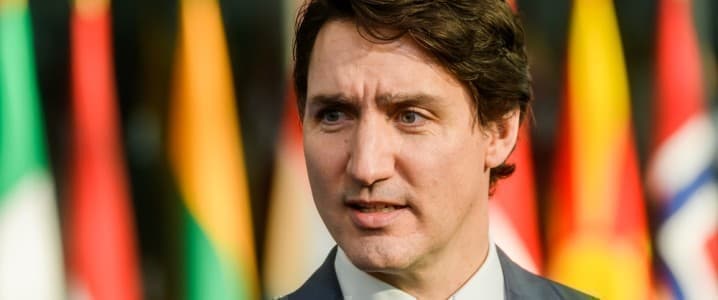Canada is raising its diplomatic profile in the Caucasus, as domestic and foreign policy considerations are pushing Ottawa into the thick of the Nagorno-Karabakh conflict.
Canadian Foreign Minister Mélanie Joly is expected to attend the opening of a Canadian embassy in Yerevan in September. Canada is also set to become the first third-party state to join the EU Mission in Armenia (EUMA), under which unarmed observers monitor conditions along Armenia’s side of the frontier with Azerbaijan. The mission strives to “contribute to human security in conflict-affected areas in Armenia,” as well as foster better Armenian-Azerbaijani relations. Canada’s observers will be drawn from the ranks of the Royal Canadian Mounted Police, a source with direct knowledge of the arrangement told Eurasianet.
Canada’s interest in South Caucasus security appears connected to an ongoing diplomatic tussle with Turkey. Canadian officials announced their decision to join the EU monitoring mission just days after NATO’s annual summit in Lithuania, where Ottawa reportedly reopened talks with Turkey about the export of Canadian defense technology. Canada canceled military export permits to Turkey in 2021, after receiving “credible evidence” that Turkey transferred Canadian-made technology to Azerbaijan that was then used to great effect in the 2020 Nagorno-Karabakh war. “This use was not consistent with Canadian foreign policy, nor end-use assurances given by Turkey,” said former Canadian foreign minister Marc Garneau.
In exchange for supporting Sweden’s NATO bid, Turkey is demanding that its NATO allies, Canada included, drop embargoes on defense technology. A Reuters report cited an unnamed Turkish official as saying it was unacceptable for NATO allies to impose export restrictions on each other.
During the 2020 Nagorno-Karabakh war, drones played a major role in helping Azerbaijan recapture large swathes of territory. Amidst the fighting, Armenian forces shot down a Turkish-made TB2 Bayraktar drone, which was equipped with what Armenian Prime Minister Nikol Pashinyan said was an “ultramodern optical unit that was produced in Canada.” The component was indeed the MX-15D targeting system, made by Canadian defense manufacturer L3 Harris Wescam. “It’s the brains of the system,” Chris Kilford, Canada’s former military attaché to Turkey, told Eurasianet.
Without sufficient air defenses, the Armenian military suffered heavy losses from attacks by Azerbaijan’s fleet of TB2s. And it was this Canadian component that was critical to the drones’ effectiveness.
“I think what will happen is that the embargo will be lifted, but it will come with certain export controls,” Kilford said. Canada is hoping, it appears, that by joining the EU border monitoring mission in Armenia, it can hedge against any potential political fallout of lifting the embargo. Prime Minister Justin Trudeau’s government doesn’t want to create complications for NATO by maintaining the embargo, but neither does it want to alienate a small, but influential domestic constituency, the country’s Armenian diaspora community.
“The government here might be weighing up the domestic damage that could be done by lifting the embargo,” Kilford said, referring to the potential for vocal diaspora opposition. Canada’s next federal election won’t take place until 2025, but the popularity of Trudeau’s Liberal Party is sagging, and the government already faces an uphill struggle to retain power.
Joly already seems to be vigorously courting diaspora support. On August 20, she met with representatives of a diaspora organization, the Armenian National Committee of Canada (ANCC), during which they presented policy recommendations to ease hardships faced by Armenians in Karabakh. Joly also spoke at an annual festival of diaspora Armenians, held in Montreal from August 18-20, saying that Canada would play an active role in troubleshooting Karabakh-related issues. “It is important for Canada to play a very important role in the region,” Joly said in a video distributed via the @301arm channel on the platform formerly known as Twitter. “Armenians are facing a real threat in Artsakh.” Joly’s use of the term Artsakh, which is the Armenian word for the contested enclave, certainly pleased her Montreal audience, but its use in diplomatic dealings would be sure to alienate Azerbaijan.
While Kilford believes the embargo will ultimately be lifted, Canada could still block Turkey from importing the targeting pods from L3 Harris Wescam. Yet, even if Canada does so, the Turkish defense industry appears close to producing a suitable replacement. After Canada initially canceled its permits, Turkey developed its own targeting system for TB2s called CATS, made by Turkish defense manufacturer Aselsan. “I’ve visited many of Turkey’s arms manufacturers over the years. If they have to rely on their own CATS systems, it will become better and better,” Kilford said.
The main reason for Canada’s increased engagement with Armenia, Kilford says, is to exert a greater degree of influence over future developments, including the possible normalization of relations between Armenia and its Turkic neighbors.
While the EU monitoring mission has faced criticism over its inability to deter sporadic fighting along the border, it is still useful “in the margins,” said analyst Eric Hacopian. The patrols increase the potential political cost Azerbaijan could pay for conducting potential military operations on Armenian territory, he added.
By Fin DePencier via Eurasianet.org
More Top Reads From Oilprice.com:
- Athens Summit Hints At Future EU Expansion Challenges
- BRICS Represents Nearly Half Of Global Population
- Russia’s Mining Heartland Grapples With Fallout From Ukraine War


















